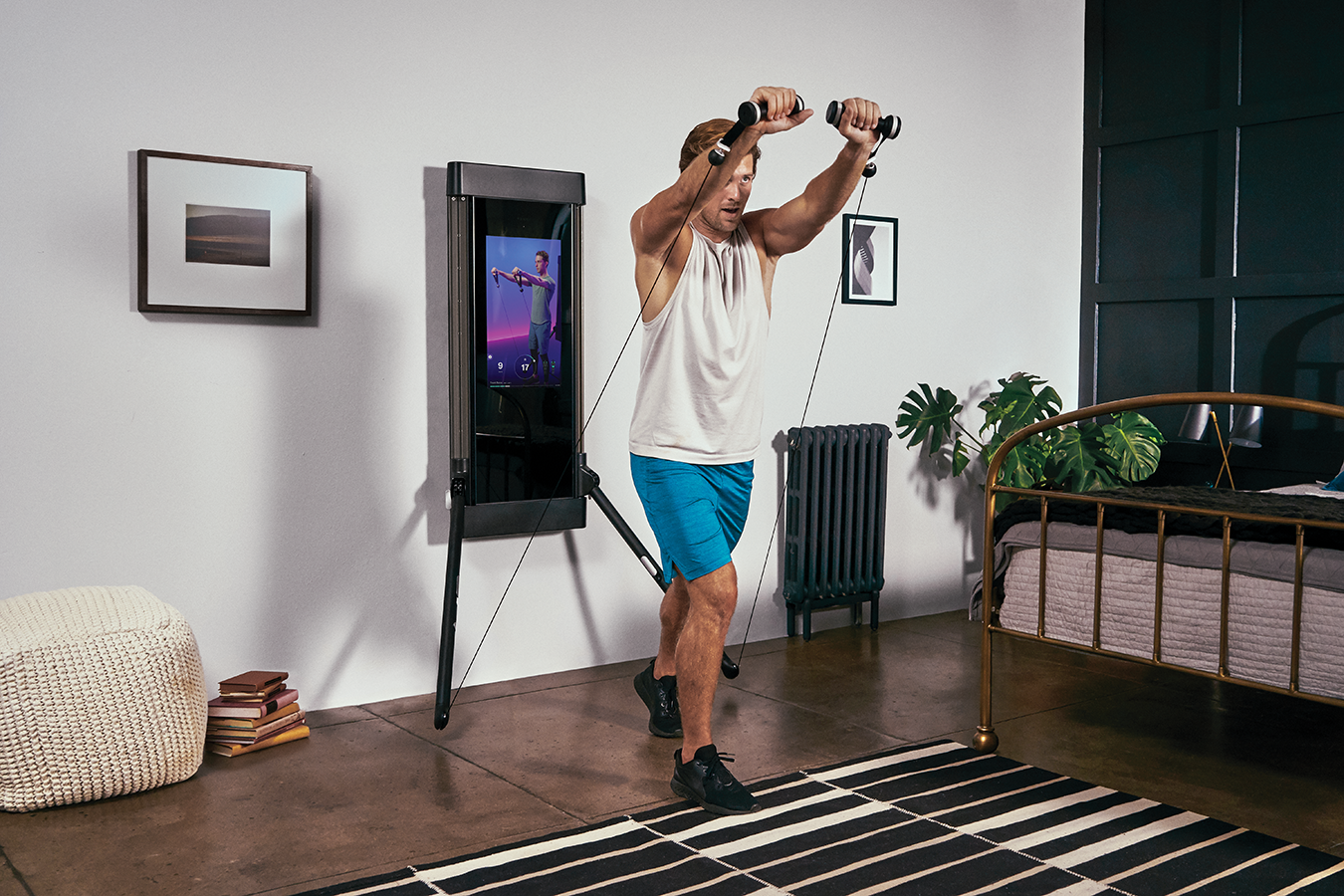The early days of the pandemic proved a massive boon for the home fitness crowd. Gyms closed indefinitely, and even when they began reopening, many members seriously questioned whether the model would continue to suit their life, moving forward. Peloton, for one, was in a perfect place to capitalize on the trend, with a significant head start from the pack.
Ultimately, however, the company overshot it. It seemed clear to casual observers that — while the category would gain some lasting momentum — reality would eventually set in as the world reopened, sending many crashing back down to earth. Of course, woes from companies like Peloton and Mirror weren’t the product of any one thing.
Weight training platform Tonal has also had its own struggles in recent years. Last July, it confirmed that it had let go 35% of its staff, noting that the move was the “responsible” choice amid continued headwinds.
“Tonal is prioritizing becoming a self-sustaining business with an emphasis on profitability,” the company told TechCrunch. “While sales have continued to grow at an unprecedented rate, so have the costs of our business, particularly in light of the macroeconomic climate and global supply chain challenges.”
Tonal’s team, pre-pandemic. Image Credits: Tonal.
This week, founder Aly Orady stepped down from his role as CEO, effective immediately. In his wake, Tonal’s president, Krystal Zell, is stepping into the top spot, nine months after joining the company. According to the company, her initial position put her in charge of “revenue, sales and marketing, product, and content.” Prior to joining Tonal, she spent five years as Home Depot’s Chief Customer Officer, with a focus on e-commerce.
Speaking with TechCrunch, Zell says her rapid ascension to the top spot was not Tonal’s plan from the start. “I was happy to take on the challenge,” she says. “I think a big part of it was just trying to figure it out as the market was shifting from a massive growth at all costs into a measured growth and path to profitability. I think it worked out really well, because the skills I was able to bring to the table are more about how to drive very disciplined, profitable growth.”
Orady is staying on at the company, but is shifting to a more technology-centered role as CTO — a desire Zell says was at the heart of his decision to walk away from the chief executive spot.
“Aly and I have a very symbiotic relationship,” she adds, “because we really complement each others’ strengths and capabilities. He missed focusing on technology, because the last two to three years of running the business took him out of that focus and had him focusing on dealing with all of the challenges that hypergrowth created.”
Shifting away from “growth at all costs” had some human collateral. Zell’s role as president was announced the same month Tonal laid off nearly one-third of its staff. That, at least, is a familiar story. The most notable example in the category is, once again, Peloton’s. The scale is a dramatically different one. At the time of its layoffs, Tonal’s headcount was reported as around 750. Peloton, on the other hand, underwent four rounds of layoffs in 2022, with 2,800 cuts in February, 540 in July, 784 in August and around 500 in October.
Zell says her primary focuses have been on marketing and channel. The company doesn’t disclose the location of its manufacturing for fear of losing a “competitive advantage,” though domestic/local manufacture and assembly have clearly been top of mind for many big-ticket home fitness makers, particularly in the wake of years of supply chain constraints.
On the marketing side, that means casting a smaller, more targeted net. At the height of the connected fitness crazy, high-cost national advertisements were suddenly par for the course, in a bid to capture the attention of consumers who suddenly found themselves stuck at home.
“We were doing a ton of top line marketing, driving brand awareness and a lot of TV advertising,” says Zell. “We did get great brand awareness, but we’ve shifted into a bottom of funnel approach to marketing to really hone in on performance and reduced a lot of that top of funnel marketing, in order to be as effective as possible.”

Tonal Device. Image Credits: Tonal.
Along with the executive suite shakeup, Tonal announced a new round of funding. The company has raised $130 million, led by L Catterton, Cobalt, Dragoneer, Kindred Ventures and THVC. In spite of shifts in the category, layoffs and broader macro trends, Zell says finding backers wasn’t an issue this time around. “We have outstanding investors,” she says, “and they really believe in Tonal. They believe in the business and were extremely supportive.”
The company isn’t disclosing valuation at the time. The raise is a little over half of the $250 million Series E it drummed up in 2021, which cemented its unicorn status with a $1.6 billion valuation. Growth was clearly the name of the game back then, with Orady noting at the time, “We’re really getting ready to scale the business: we’re pouring a lot more capital into marketing and brand awareness, and we’re pouring a lot more capital into scaling our supply chain to get ready for the next phase, which I really think is the next two holiday seasons.”
For reasons highlighted above, priorities have shifted considerably. Among other things, Tonal was ultimately saddled with too much inventory. “We’ve done a ton of work to work through that,” says Zell. “As we get through the completion of fundraising, the outcome of that is, within a very short amount of time, we will have a supply chain that is nicely lined up to match.”
Other key changes include potentially adjusting the product roadmap to match consumer demand, and exploring additional brick and mortar options. Currently the Tonal system is available in five stores, along with some Nordstrom locations, which offer user demos. For all of the rapid growth, Tonal wasn’t nearly as aggressive on the retail front as Peloton, which ended up closing a significant number of its stores alongside layoffs.
Zell says the company is “really close” to achieving profitability on an adjusted EBITDA basis following nine months of difficult choices. As for a future IPO, she says “that will be a possibility at some point in the future. Not near term, but a potential longer-term future.”
After a turbulent few years for home fitness, Tonal gets fresh funding and new CEO by Brian Heater originally published on TechCrunch
Source : After a turbulent few years for home fitness, Tonal gets fresh funding and new CEO












